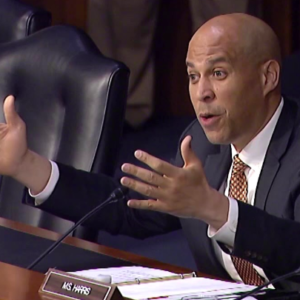Should a traditional Catholic be allowed on the federal bench? Should an evangelical Christian be able to sit in judgment of the law? What about conservative Hindus, Orthodox Jews or practicing Muslims?
For more and more prominent figures in the Democratic Party, the answer appears to be “no.”
On Tuesday, New Jersey Democrat Sen. Cory Booker–who released a video announcing his candidacy last week– questioned the personal religious views of Neomi Rao, President Trump’s nominee to replace Judge Brett Kavanaugh on the DC Circuit Court of Appeals.
“Do you think gay relationships are immoral?” Booker asked the nominee.
“I do not,” Rao answered.
“Do you believe they are a sin?” Booker followed up. When Rao declined to answer, he pushed her again: “So you’re not saying here whether you believe it is sinful for two men to be married. You’re not willing to comment on that?” Booker pressed.
“My answer is that these personal views are ones that I would put to one side, whatever my personal views are on this subject, I would faithfully follow the precedents of the Supreme Court,” she replied.
Booker also asked her how many of her law clerks have been LGTBQ (“I’ve never been a judge so I’ve never had a clerk”) then demanded to know how many of her employees are gay.
“I don’t know the sexual orientation of my staff,” she said. “I take people as they come, irrespective of their race, ethnicity, sexual orientation.”
These questions may sound irrelevant and off-putting to people who haven’t been following politics closely, but Sen. Booker’s questions are part of a trend that has emerged over the past two years: prominent Democrats challenging nominees on their personal religious views, suggesting that they raise questions about the nominee’s fitness to serve.
In her prepared questions for a judicial nominee in December, for example, Sen. Kamala Harris (D-CA) — another announced 2020 contender — raised questions about judicial nominee Brian Buescher over his membership in the Catholic service organization the Knights of Columbus. After noting it’s an “all-male society,” Sen. Harris demanded “Were you aware that the Knights of Columbus opposed a woman’s right to choose when you joined the organization? Were you aware that the Knights of Columbus opposed marriage equality when you joined the organization?”
Buescher, a lifelong Catholic, answered: “I do not recall if I was aware whether the Knights of Columbus had taken a position on same-sex marriage at the time I joined at the age of 18.”
A year earlier, questioning judicial nominee and Notre Dame law professor Amy Coney Barrett, Sen. Dianne Feinstein infamously declared “The dogma lives loudly within you” regarding the nominee’s Catholic faith.
Sen. Ted Cruz (R-TX) called out Sen. Booker and his fellow Democrats, saying that the Judiciary Committee shouldn’t be a “theological court of inquisition.”
“We’ve seen a growing pattern among Senate Democrats of hostility to religious faith. I have to say, I was deeply troubled a few minutes ago to hear questioning of a nominee, asking your personal views on what is sinful. In my view that has no business in this committee. Article Six of the Constitution says there should be no religious test for any public office,” Cruz said.
Conservative organizations also spoke out, complaining of “bullying tactics” from Senate Democrats. Penny Nance of Concerned Women for America called on “senate liberals to stop the religious litmus tests, gridlock and bullying tactics and confirm her.”
But are Democrats, particularly those competing for primary votes, concerned about the views of conservatives, or even people of faith? Or has the Democratic Party become a secular party where people of faith play only a marginal role?
There are only a handful of pro-life Democrats in the party today. In fact, the one US Senator Democrats often point to as pro-life, Sen. Bob Casey of Pennsylvania, has a 100 percent rating from NARAL Pro-Choice America and a 75 percent rating from Planned Parenthood.
This appears to fit the overall philosophy of the Democratic Party. According to exit data from the 2018 midterms, while voters who identify as Catholic split nearly evenly between the two parties, 63 percent of people who never attend church or religious services told pollsters they voted Democratic, while 61 percent of regular churchgoers went for Republicans. Only a third of Democrats say they believe in the biblical concept of God, according to Pew Research.
In New Hampshire, the territory is even less friendly to Democrats of faith. The home of the vital First-In-The-Nation primary is one of the most secular states in the US. A 2012 UNH poll of Democratic primary voters found 61 percent said they rarely/never attend church.
“We continue to see members of the coexist crowd, this time US Senator Cory Booker, seeking to drive supporters of traditional marriage from the public square,” said Chuck McGee of the Concord, NH Knights of Columbus. “For them, disagreement is not allowed. You must believe what they believe or be banished.”

